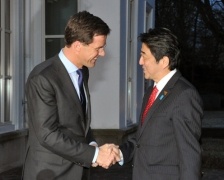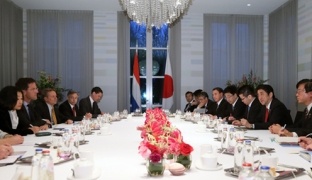Europe
Japan-Netherlands Summit Meeting
 (Photo: Cabinet Public Relations Office)
(Photo: Cabinet Public Relations Office)
 (Photo: Cabinet Public Relations Office)
(Photo: Cabinet Public Relations Office)
On Sunday, March 23, commencing at 7:00 p.m. (Local Time) for approximately 50 minutes, Prime Minister Mr. Shinzo Abe, who is visiting the Kingdom of the Netherlands to attend the Nuclear Security Summit, held a Japan-Netherlands Summit Meeting with H.E. Mr. Mark Rutte, Prime Minister of the Netherlands. The overview of the meeting is as follows.
1. Opening Remarks
(1) At the beginning, Prime Minister Rutte welcomed Prime Minister Abe’s visit, and stated that on this occasion he would like to discuss further advancing relations between Japan and the Netherlands. Prime Minister Abe replied that he highly appreciates Prime Minister Rutte’s leadership for the Nuclear Security Summit, and that the Government of Japan wants to cooperate as much as possible toward the Summit’s success. As the only country to have suffered from atomic bombings in war, Japan emphasizes the fields of disarmament and nonproliferation, and also wants to cooperate with the Netherlands on the NPDI and the IAEA etc.
(2) Prime Minister Abe and Prime Minister Rutte affirmed that Japan and the Netherlands are both maritime nations, and that they want to cooperate as strategic partners sharing fundamental values such as the rule of law.
(3) Prime Minister Rutte told he is paying attention to Abenomics as policies that are adding dynamism to the Japanese economy, and that he expects the policies will also lead to a dynamic mutual relationship between Japan and the Netherlands.
(4) Prime Minister Rutte noted that Japan-Netherlands relations have a 400-year history and 150 years of diplomatic relations, and mentioned he hopes relations between Japan and the Netherlands will continue to deepen.
2. Security
Prime Minister Abe stated he hopes to obtain understanding and support for the policy of “a proactive contribution to peace” that is based on “the rule of law” from the Netherlands, which leads the world in the area of international law. Prime Minister Rutte expressed deep understanding for the Government of Japan’s proactive efforts in the international community.
3. Bilateral Relations
(1) Prime Minister Abe expressed his hope for the visit of King Willem-Alexander to Japan in the near future.
(2) Prime Minister Abe said he is emphasizing the pursuit of future-oriented diplomatic relations while working together earnestly on past issues, and explained that he wants to continue pursuing reconciliation with former war victims etc. and mutual understanding under the Japan-Netherlands Peace Exchange Program. Prime Minister Rutte said he highly appreciates Japan’s efforts.
(3) Prime Minister Abe and Prime Minister Rutte affirmed that there is potential to further expand economic relations between Japan and the Netherlands, and that concluding promptly the Japan-EU EPA is important.
(4) Prime Minister Abe explained the Government of Japan’s agricultural policy reform, which promotes “an aggressive food, agriculture, forestry and fisheries industry,” and pointed out that the Netherlands has become the world’s second-largest exporter of agricultural products on a monetary basis as a result of highly value-added greenhouse horticulture that utilizes IT. He told he is scheduled to visit a “green port” and that Japan wants to learn from the Netherlands’ expertise.
(5) As areas for bilateral cooperation on the economic front, Prime Minister Rutte cited (1) the horticultural sector and (2) the energy-IT sector, including smart cities and wind power, and he noted that (3) both countries are faced with aging societies and in the future, policies for dealing with aging societies will in some ways represent new business opportunities. He stated he wants to pursue cooperation in areas such as these.
(6) Prime Minister Abe asked that the Netherlands contribute to an international symposium on “a society in which women shine,” which is scheduled to be held in Japan in fall this year. Prime Minster Rutte told the Netherlands wants to cooperate also.
4. Regional situations
(1) Situation in Ukraine
Prime Minister Abe stated that Russia’s annexation of Crimea is a clear violation of international law, and that the Government of Japan is condemning the action and that “changing the status quo by force” is completely unacceptable. He said that this situation is a global issue, not one region’s issue, and that the Government of Japan is scheduled to announce commensurate assistance to Ukraine. In response, Prime Minister Rutte concurred fully with Prime Minister Abe’s views, and he explained that it will be important to prevent the situation from spreading or deteriorating any further.
(2) Situation in East Asia
In response to Prime Minister Abe’s comment on the situation in East Asia, Prime Minister Rutte told the North Korea problem is extremely serious and he fully understands Japan’s position. Prime Minister Rutte stated he understands that Japan-U.S.-Republic of Korea dialogue will take place on the occasion of this Nuclear Security Summit, and that this is very welcome. He mentioned it is important that dialogue between Japan and China and between Japan and ROK moves forward.

